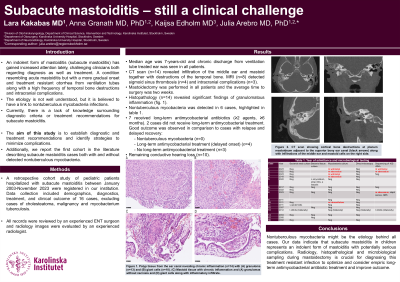Pediatric Otolaryngology
(1058) Steps Toward Improving Management and Outcome of Atypical (Subacute) Mastoiditis Caused by Atypical Mycobacteria
Monday, September 30, 2024
12:00 PM - 1:00 PM EDT

Disclosure(s):
Lara Kakabas, MD: No relevant relationships to disclose.
Introduction: Acute mastoiditis in children typically appears as a complication to an acute otitis media infections. A less common chronic mastoiditis has however also been described, challenging clinicians both regarding diagnostic aspects as well as treatment. The objectives are to analyze and review the clinical features and management of atypical (subacute) mastoiditis caused by atypical mycobacteria and improve knowledge and future management and to reduce the incidence of intratemporal and intracranial complications.
Methods: A retrospective case review of 18 patients (0-18 years) diagnosed with atypical (subacute) mastoiditis between January 1st 2003 and November 1st 2023 were identified at Karolinska University Hospital, Sweden. The main outcome measures were microbiology findings, medical and surgical interventions and outcomes. The hospital treated all children in the region with the condition during the study period.
Results: The positive bacteriological findings revealed Mycobacterium abscessus (n=3), Mycobacterium wolinskyi (n=2), Mycobacterium tuberculosis n=2), Mycobacterium intracellulare (n=1). Computer tomography-verified bone destructions in 17 cases (94%) and mastoidectomy was performed in all patients. Histological features of granuloma was highly present. Systemic antibiotic treatment was given to 14 patients. Six patients had intracranial spread of the disease. Twelve patients healed completely.
Conclusions: Atypical (subacute) mastoiditis is a severe ear disease and should be treated aggressively in order to avoid morbidity. Incidence of positive finding of the acid-fast bacilli mycobacteria increased over time leading to improved diagnostics and heightened awareness of NTM infections.
- LK
Lara Kakabas, MD
MD
Karolinska University Hospital
Stockholm, Stockholms Lan, Sweden
